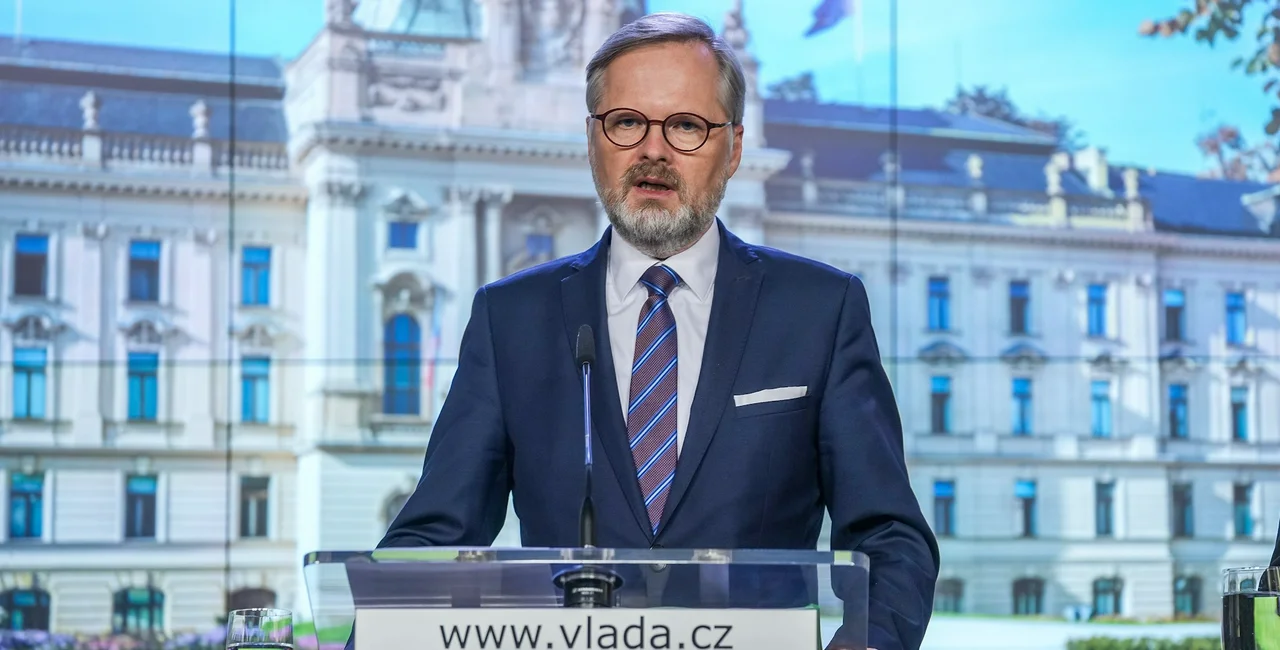In an effort to tackle Czechia’s alarmingly increasing public debt, Prime Minister Petr Fiala has announced this afternoon several significant fiscal measures in an ongoing press conference. These include the abolition of 22 tax exemptions and the merging of three tax rates into two in order to raise at least CZK 70 billion.
Simpler VAT brackets
Following the merging of VAT rates, taxes on alcohol, tobacco, and gambling will increase, which will in turn most likely bump up the prices of these items. VAT on food, medicine, and housing, on the other hand, will lessen.
The current basic VAT rate – at 21 percent – is set to remain. The government wants to impose just one reduced tax rate of 12 percent. At present, there are two reduced VAT rates: one at 10 percent and the other at 15 percent. There will be no VAT on books.
Several items will be moved to the higher VAT rate. Draft beer, which today has the lowest rate of 10 percent, will now have 21 percent VAT. Services of hairdressers or newspapers, for example, will be also moved to the highest band.
Excise duties on cigarettes, tobacco, and cigars will rise by 10 percent next year and by a further 5 percent in each of the following three years.
summary of biggest changes
- The government will remove one VAT bracket, leaving just two VAT rates instead of the current three
- Taxes on alcohol, tobacco will increase
- The VAT rate for food, medicine, and housing will decrease
- Insurance payments for self-employed people in Czechia will increase in the next three years
- People will have their retirement age calculated when they reach age 50. It will be indexed to the life expectancy of the time
- The minimum basic pension is set to rise from 10 percent of the average national wage to 20 percent
- Corporate income taxes and property taxes will increase
- The threshold to pay the highest rate of income tax (23 percent) will decrease from a monthly income of CZK 161,000 to CZK 121,000
- The government will reintroduce sickness insurance for employees at a rate of 0.6 percent of employees' wages
- The student tax discount will be abolished
Heated tobacco will increase by 15 percent each of the next four years. A new excise duty will also be introduced on nicotine pouches and refills for e-cigarettes. This will make all aforementioned items more expensive for the consumer.
Change needed, says PM
According to the prime minister, if no action would have been taken, the budget deficit for 2024 would be CZK 94 billion higher. The following year – under current conditions – it would be CZK 148 billion greater. Fiala called the current rate of public indebtedness threatening and said that it is a legacy of previous populist-socialist governments.
TOP 09, one of the ruling parties in government"The debt on Czechia's pension account this year alone already amounts to CZK 17 billion. In the last 12 years, pension expenses have almost doubled. We have to put a stop to this"
The reduction of non-investment grants and subsidies given to individuals and entities will raise as much as CZK 46 billion, the government said. The state also hopes to save CZK 20 billion by reducing “wage and operating expenses.”
Tax discounts for non-working spouses will end unless their child is under the age of three.
The government also announced today that it will gradually increase the minimum insurance premium for self-employed workers over the next three years. This will come into effect in 2024.
Recalculating Czechia's retirement age
Presenting the pension reform, Minister of Labor Marian Jurečka said that people’s retirement age would change and that it would be calculated when they reach 50 years of age, based on the current life expectancy of the time. Jurečka wants people to be retired for an average of 21.5 years.
At present, the retirement age in Czechia on average is rising for men by two months a year and for women by about four.
People who have already worked (and paid insurance) for 45 years will be able to retire early. Those who work in “physically challenging” professions (such as intense manual labor or hazardous work) will also be able to retire about three years earlier under the proposed plans.
He also said that, although short-term pension growth would slow down slightly, the next 10 years would see an average pension increase of CZK 10,000.
Jurečka also said that he wants the lowest possible basic pension to be 20 percent of the average national wage, rather than the current 10 percent. The government also said it would motivate people to work in retirement via so-called discounts on social insurance.
Corporate income taxes will increase by 2 percentage points, from 19 to 21 percent. Property tax is also set to rise by up to twofold. The price of an annual highway stamp will also increase by CZK 800.
Czechia's total government debt surpassed CZK 1.3 trillion at the end of last year – and is fast increasing. The government hopes that its widescale fiscal changes will steer the country's economy away from decline and toward some form of stability.












 Reading time: 4 minutes
Reading time: 4 minutes 


























